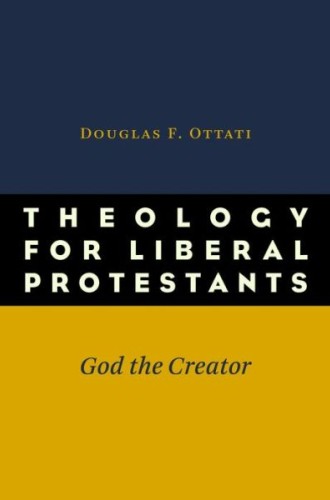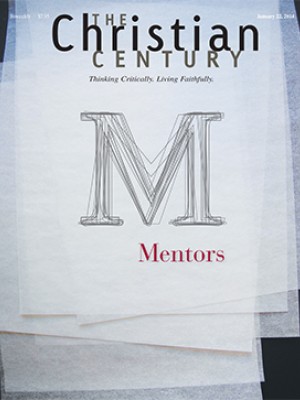Theology for Liberal Protestants, by Douglas F. Ottati
Doug Ottati is widely known as a wry and disarming teacher of liberal Reformed Protestantism. Through his teaching at Davidson College and at Union Theological Seminary in Virginia (now Union Presbyterian Seminary), and in volumes such as Jesus Christ and Christian Vision, Hopeful Realism and Reforming Protestantism, he has developed a rare gift for speaking clearly about God, the world and humanity in ways that illumine the connections between classical theological propositions and ordinary living.
Theology for Liberal Protestants: God the Creator is the long-awaited first volume of his systematic theology. He offers a lengthy introduction to his overall project and theological method, followed by a discussion of creation that includes the classic themes of providence, theological anthropology, and God as Creator and Provider. The planned second volume will discuss God the Redeemer, with attention to Christology, sin and judgment, reconciliation and renewal, the church, history and eschatology.
Read our latest issue or browse back issues.
As in previous work, Ottati explains his embrace of the much-maligned term liberal, clarifying that this descriptor signals his commitments to critical argument, historical consciousness and “social criticism, engagement, and reform.” Such a broad account of liberalism surely includes many who shy away from the term. It might spark a fresh reclamation of liberal identity among mainline Protestants. A term that is equally maligned and defended by Ottati is systematic with reference to theology. He acknowledges critiques of the theological systems of Karl Barth and Gordon Kaufman, yet argues that systematic attention to the interaction of various aspects of Christian piety and belief leads to clarity, coherence and depth of understanding that are otherwise unavailable.
Ottati draws deeply from his theological forebears in the Reformed subtradition and, like them, is willing to critique distortions in his own strand of Christianity. From Calvin, he draws a fundamental commitment to theology “within the limits of piety alone”; from Edwards, attention to the importance of the religious affections; from Schleiermacher, the energy to revise theology in light of recent findings of history and science; from H. Richard Niebuhr and James Gustafson, an unflinching theocentric perspective and vigilant attention to the ethical consequences of theological statements. These influences, among others, become clear in his definition of theology as “practical wisdom that articulates a vision of God, the world, and ourselves in the service of a piety, a settled disposition, and a way of living.”
This is the genius of Ottati’s work: he is ever illuminating ways that theology is a source for rather than an obstacle to piety and practical living. Those of us who teach theology in colleges and seminaries will rejoice at his winsome examples of how particular theological statements both express and shape concrete ethical life in the world. For instance, he reflects on the peculiar task of raising adolescent children. Recognizing that they challenge authority, sleep until noon and “lurch toward questionable decisions about their futures,” he points out that when we view them also as gifts of God who do not belong to us, we may find our dispositions shaped by gratitude to God and respect for the integrity of our offspring. In such ordinary theological reflections, Ottati is a faithful follower of Calvin, who eschewed “idle speculation” that spends energy on abstract questions with no clear connection to faithful living.
At times Ottati is explicit about his distaste for idle speculation. In his discussion of doctrines of creation, for instance, he notes Jürgen Moltmann’s proposal that “God makes room for creation by withdrawing his presence.” Though he acknowledges the rhetorical power of Moltmann’s suggestion, he wonders about the speculative dimensions of such discourse. From the point of view of practical wisdom, can we ever know whether this is an accurate portrayal of creation? Can the biblical witness bear the weight of these reflections?
More subtle is Ottati’s reservation regarding discussion of the immanent Trinity on the grounds that such a formulation of a “common divine nature, being, or substance” shared by God, Christ and Spirit is not required. He promises to discuss this fully in the forthcoming second volume. I wonder whether he regards this as another instance of theological speculation that is neither warranted by the biblical text nor especially fruitful when it comes to forming and shaping piety.
I share Ottati’s commitment to theology that avoids speculation and focuses on piety and practical living. But how do we adjudicate what is idle speculation and what is appropriate symbolic language that shapes a piety of gratitude and an ethics of social engagement? For instance, Ottati suggests that Moltmann’s view of creation ex nihilo, grounded as it is in the new creation of resurrection, is unduly speculative. But might it not be seen as powerful symbolic language (of the sort that Ottati himself uses) that points to God’s creative transformation of the world—a theological commitment that grounds a piety of hope and inspires liberating political action?
One particularly excellent section, which could easily be excerpted for teaching purposes, is his lucid discussion of anti-Judaism in Christian theology. This clear and forthright exposition is but one example of Ottati’s calm willingness to expose Christian heresies of the past, even those that involve major theologians, without apology or defense. Noteworthy as well is the way that he condemns heresy without dismissing as wholly unworthy the theologians who perpetuated it. In this way, he displays in his theological method his Augustinian conviction that all people, even Christian theologians, are good creatures corrupted by sin and able, by the grace of God, to be redeemed.
Having read this first volume, I am left wondering about the relative invisibility of the Holy Spirit in Ottati’s system so far. The treatment of creation and providence in this volume contains no discussion of the Spirit at all. The second volume will address both God’s acts of redemption in Jesus Christ and the way that we “receive Christ’s benefits” (as Calvin puts it) through the Holy Spirit. Yet unlike Calvin, Ottati does not distinguish his treatment of the Spirit from his treatment of God’s act of reconciliation in Christ. I am curious about how this will finally work out: Will Ottati attend sufficiently to the particular work of the Spirit in creation and in human lives? What are the advantages of an integrated approach that does not separate out discussion of the Spirit? Is Ottati trying to move away from classical trinitarian speech out of concern that it borders on idle speculation about the inner workings of the triune God? Whatever the case, this lack of attention to Jesus Christ and the Spirit leaves me hungry for the next volume.
Whether or not you identify as a liberal Protestant, Ottati’s work is eminently worth reading. He writes in the clear tones of a professor adept at engaging eager young undergraduates, as well as equally eager, sometimes overly pious seminarians uncertain about the whole enterprise of theology. With story, song and a calm narrative style, he lures his readers into theological reflection that attends at once to the ordinary details of human life and to expansive wonder at the glory of God.







